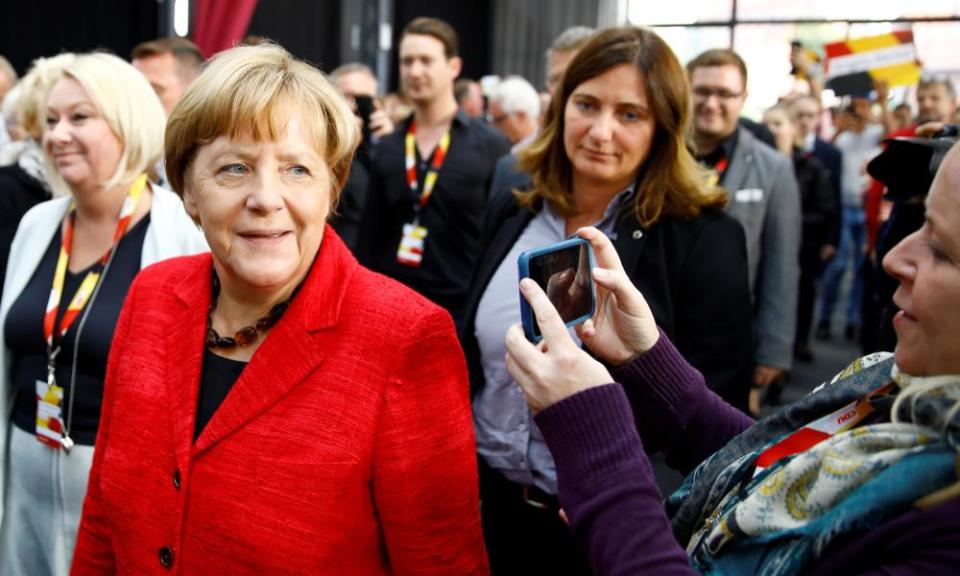Volatile is the new normal for unpredictable European elections

The likelihood that Ukraine will elect a comedian as president this weekend is no laughing matter for serious students of European politics fretting over the outcome of next month’s EU parliamentary elections. The expected victory of Volodymyr Zelenskiy, a policy-free parvenu who leads the incumbent, Petro Poroshenko, by 35 points could be seen as the ultimate triumph for the anti-politics, anti-establishment mood gripping Europe.
Democratic insurrections of this kind, confounding conventional wisdom, are not as rare as might first appear – although Ukraine is an extreme case. The US has experienced periodic, Trumpian spasms of anger against politics-as-usual, spawning rambunctious campaigns to “throw the bums out”. In 1992, a plausible nobody from Arkansas, Bill Clinton, was the direct beneficiary of Ross Perot’s insurgent revolt against the then-president, George HW Bush.
Closer to home, the upstart Five Star Movement, founded in 2009 by another comedian, Beppe Grillo, came from nowhere to storm Italy’s political establishment, winning power last year (albeit alongside the far-right Lega). Greece, Spain and other European countries have seen similar, recent upheavals as traditional left-right, two-party systems have fractured under the weight of popular dissatisfaction and non-ideological, issue-led campaigns. Although Britain always claims to be different, the 2016 Brexit vote reflected this trend.
As the EU elections approach, an ambitious new survey of 46,000 voters in 14 member states (not including Britain), conducted by the independent European Council on Foreign Relations (ECFR) and YouGov, confirms that pervasive feelings of alienation and distrust of political classes are running as high as ever. As a result, it suggests, Europe is experiencing red-zone levels of electoral volatility, a powerful, shared yearning for change, and a lack of confidence that it will be delivered. Everything is up for grabs.
Predictions that fewer than half of Europe’s voters will actually vote in May are not unusual. Five-yearly turnout has been falling steadily since 1979. In 2014, it was 43%. Yet according to last year’s Eurobarometer survey, roughly two-thirds of Europeans believe their country has benefited from EU membership, the highest percentage since 1983. It is also expected that mainstream coalitions will retain overall control of parliament. But these headline figures hide a lot of angst and pain.

Angela Merkel arrives for an election rally.Photograph: Axel Schmidt/Reuters
In France, where the gilets jaunes protests, speaking to a nationwide sense of grand malaise, have humbled President Emmanuel Macron, an extraordinary 69% of voters believe both the national political system and the EU system are broken, according to the ECFR’s findings. High numbers of respondents in Greece – the unhappy recipient of EU-imposed austerity – Italy and Spain feel the same way. East Europeans tend to think the EU works fine – but only by comparison with their own governments.
Even in Germany and Sweden, traditionally viewed as two of Europe’s more stable and conservative states, 35% of voters said national and EU-level politics were not working. So no surprise, perhaps, that there, as elsewhere, established political parties are coming under enormous pressure. Angela Merkel’s ruling CDU/CSU centre-right coalition, for example, can now count on a solid base of only 8.6% core support, and the centre-left Social Democrats only 3.4%, the survey found.
By such measures, volatility is the new watchword, a phenomenon that may, paradoxically, become permanent. Almost 100 million voters – about 70% of those intending to vote – have yet to decide who to support. Just as significantly, a large proportion of them could shift left or right, depending on the choices on offer and the issues that matter most to them. The polls thus look set to become a full-spectrum fiesta for new and old, large and small political groupings of myriad persuasions, trashing treasured shibboleths about affiliation, loyalty and tribe.
“Rather than comprising a stable, predictable electoral community of citizens who are organised into parties, the European political system has descended into an unpredictable battleground of constantly shifting alliances between groupings that come together momentarily before blowing up again afterwards,” the ECFR says.
At the same time, the survey suggests, fears of a destabilising, Europe-wide rightwards shift in favour of nationalist-populist groups, or of an east-west EU split, are exaggerated. Although anti-immigrant parties, such as Germany’s Alternative für Deutschland, Italy’s League and France’s National Rally (National Front) are expected to make gains, the migration issue is not dominating the polls in the way far-right extremists had hoped.
A range of concerns, including the economy, rising nationalism, Russia, emigration (to wealthier countries) and climate change, were identified as key factors influencing voter choices across the EU. If one common issue stood out, it was fear of Islamic radicalism, not immigration, the survey found. “Hungary is the only country where immigration is still felt to be the number one threat... In every other one of the 14 countries polled, one of at least five other themes emerged that are equally, if not more, important to Europeans.”
Hungary, led by Viktor Orbán, a standard-bearer for Europe’s rightwing nationalist-populist forces, is an interesting case in point. Despite their prime minister’s visceral Euroscepticism, more than 60% of Hungarian voters say their European identity is as important to them as their national identity. Majorities in most other countries (including Greece, Italy, Germany and Spain) think likewise. Yet proving some things never change – however volatile the political climate – the French say being French is more important.

 Yahoo News
Yahoo News 